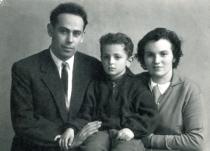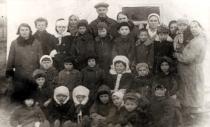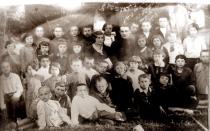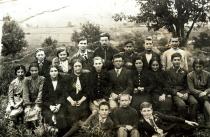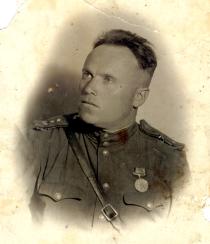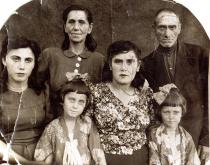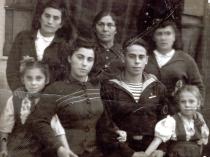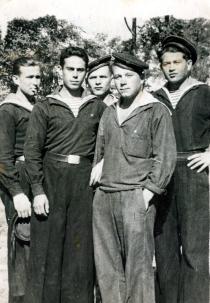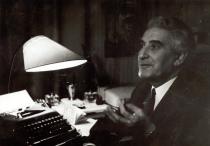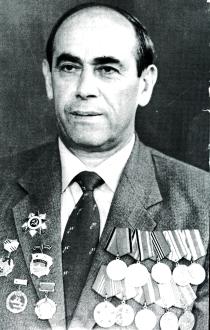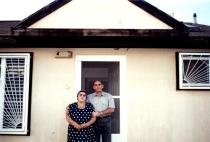Two years after our liberation from the Tomashpol Jewish ghetto. From left to right: my sister Polia Driz, born in 1929, my cousin Manya, born Krivoviaz, and her twin daughters, Polia on the left, and Dora. Manya was raised by my parents. She stayed with us until she married in 1940. Her twin girls were born on 19 May 1941 and in 1941 they got to the ghetto when they were still baby girls. Our family spent two years and 8 months in the ghetto. Upper row: my mother Tsypa Driz, born in 1893, and my father Abram Driz, born in 1884. My father was sent to the ghetto in Varvarovka after he spent some time in the concentration camp, and then, when he was so exhausted that he couldn't go on working, he was sent to the death camp Pechora. They took this photo to send me to Port Arthur where I was in the Navy. Inscription on the backside 'To our dearest son Yashenka from Manya, Dorochka and Polichka with love'.
My mother's name was Tsypa; her nee name was Zeltser. She was born in the Jewish town of Miastkovka - present Gorodovka - not far from Vinnitsa in 1893. The only thing I know about my mother's parents is that her father's name was Yankel. After their wedding, my parents moved to Tomashpol. My grandparents on my mother's side died before I was born. My mother often told me that she was a granddaughter of the Miastkovka rabbi even at the time when it was dangerous to mention such facts. They had three daughters in the family. My mother was the youngest. Their oldest daughter Haika, born in 1890, moved to the village of Velikays Kostnitsa near Bessarabia, in the Vinnitsa region, on the Dnestr River. My aunt's husband worked at the mill. They had no children. At the beginning of the war Aunt Haika's husband went to the front. He fell in love with a nurse there and never returned to my aunt after the war ended. She moved to Tomashpol and lived with my parents there until she died. The second sister was born in 1892. I don't remember her name. She and her husband David Krivoviaz died during an epidemic. They had a daughter Manya. My parents took Manya to live with us, where she remained until she got married. We spoke Yiddish in our family. Their daughters were educated at home. They didn't go to school, they had private teachers at home to teach them to read and write, as well as to tutor them in the rules of conduct in society, good manners and foreign languages - German and French.
My distant relative from Yampol, Manya. On 19 May 1941 Manya gave birth to two twin girls: Polia and Dora. Manya's husband and his two brothers went to the war where they perished. Manya and her children lived in this ghetto for two years and eight months. We lived behind the barbed wire fencing with no money or food. It was so hard to raise these baby girls. Manya died in 2001 and her girls are still living. Of course, the years they spent in the ghetto had their effect on them, and they are sickly, but they are still alive.
We were all living together: my parents, my sister Polia, Manya and her twin daughters. A little later my mother's sister Haika also moved in with us. In 1944 I went into the army.

